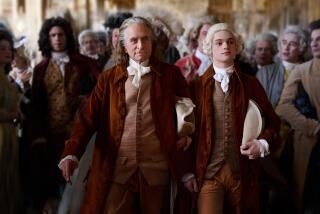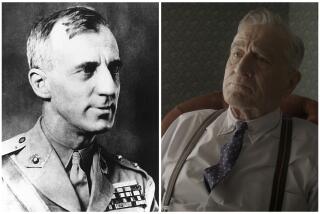The Other Side of Washington
- Share via
A&E;’s “The Crossing” presents a George Washington vastly different from historical myth. The drama finds Washington at the end of his tether with his back against the wall.
In December 1776, the American colonies’ Continental Army was in tatters. Washington and his men had suffered defeat at the hands of the British in Brooklyn Heights, Staten Island and New Jersey. The few young soldiers who hadn’t fled were starving, cold, ill-equipped and a few short weeks from the end of their service. So when the Continentals reached the Delaware River Christmas week, Washington knew desperate measures were in order to save the army.
“The Crossing,” which premieres Monday, dramatizes how Washington turned the tide of the Revolutionary War by leading his men across the Delaware in the middle of the night to attack Hessian mercenaries in Trenton. Not only was the attack a success, not one single American soldier was hurt or died.
Adapted by Howard Fast from his novel and directed by Robert Harmon, “The Crossing” stars Jeff Daniels (“Pleasantville”) as Washington and Sebastian Roche (“The Hunley”) as Col. John Glover, the plain-spoken and brilliant commander who ultimately organized the river crossing.
Fast wrote the script 10 years ago and desperately tried to get it made as a feature. “No studio wanted it,” he laments, especially after the failure of such period war films as “Revolution.” “But A&E; is marvelously open,” Fast says. “They were delighted to do it.” Save for the CBS miniseries “George Washington,” which starred Barry Bostwick in the title role, Washington rarely has been portrayed on TV or in movies. Fast’s explanation: The first president has been “dehumanized” over the years.
“The West Coast is so far from the Colonial East to comprehend [this period]. I think this is why all former attempts [to dramatize Washington] have more or less failed. It requires a special immersion in colonial America to grasp it completely.” Washington was a man of many contradictions. He was an absolutely fearless, emotional man, who “loved women,” Fast says. “He had quite a history with women which nobody writes about and nobody speaks about which is all together proper in my way of thinking. He was a very handsome man. Jeff Daniels is the same size and looks amazingly like him.” His one big flaw was his horrible temper. “On the other hand, he was also very coolheaded and knew precisely what he was doing,” says Fast. “[Crossing the Delaware] is what came after a series of awful defeats.” Daniels, who admits he’s not a history buff, says this was a part he couldn’t refuse. “If you read it and you don’t really have a clue as to how to pull it off, it’s usually a good sign that you are going to be challenged.” The actor had just a month to prepare for the part. During his research, Daniels discovered that Washington was truly an enigma. “He is the face on the dollar bill and he’s Mount Rushmore.” Daniels says he was amazed by what he learned about the man. “He wasn’t this stoic figure,” he says. “He was at times so soft-spoken you couldn’t hear him. By the time this movie is beginning the men have lost respect for him. Guys like Glover are just snapping back at him.” Glover, says Roche, is one of the least-known figures of the war. “He was an amazing historical figure,” says the Scottish-French actor. “He educated himself, he was a brilliant businessmen. He bought his own sailing fleet and was captain of his ships.” Roche found it easy to get into Glover’s skin because he, too, is a sailor. “I lived for six years on a sailing boat,” he explains. “You have to be very disciplined and straight to the point. You have to be brutally honest.” “Glover used to walk around with a sword and a bayonet and two silver pistols,” Roche continues. “He sounded like the Patton of his day. He was very good to his men and very brave. The actual crossing was very difficult. The organization was quite a feat. They needed a strong man like Glover.” Washington’s decision to attack Trenton, adds Roche, was an inspired moment. “Washington saw that this was his last chance,” he says. “The men truly loved him. He knew about the human spirit.” *
“The Crossing” will be shown Monday at 5, 7, 9 and 11 p.m. on A&E.; The network has rated it TV-PG-V (may be unsuitable for children with special advisories for violence).
More to Read
The complete guide to home viewing
Get Screen Gab for everything about the TV shows and streaming movies everyone’s talking about.
You may occasionally receive promotional content from the Los Angeles Times.







